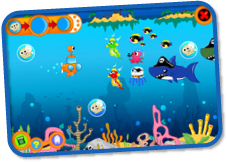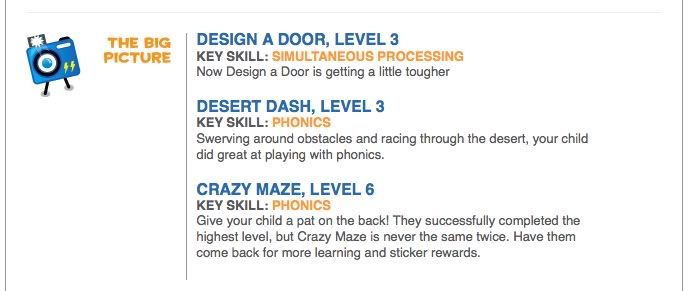Learning to read is one of those huge childhood milestones,
but until I had children who struggled with it, I didn't think about all the skills that needed to be in place
before a child can actually start reading with any fluency.
Go Go Kabongo is an online environment, currently consisting of three "habitats" containing three educational games each, and those games move up through six levels of difficulty.
I had Trina (5) and Richard (7) use Go Go Kabongo. Trina played with it a lot more than Richard did, but once Richard moved up to higher levels in most of the games, he did find this to be a lot more fun and he wanted to play. Initially, I really had to force him.
The games include:
Go Go Kabongo is an online environment, currently consisting of three "habitats" containing three educational games each, and those games move up through six levels of difficulty.
I had Trina (5) and Richard (7) use Go Go Kabongo. Trina played with it a lot more than Richard did, but once Richard moved up to higher levels in most of the games, he did find this to be a lot more fun and he wanted to play. Initially, I really had to force him.
The games include:
- sorting animals by size (Critter Sizer), this one starts off pretty easy -- small vs. big. But it gets harder, and Richard got really frustrated when he started to have to sort the critters by whether their name has one syllable, or more than one. I think partially he was distracted and didn't quite understand the directions here.
- collecting objects in a specific order (Scuba Dude), where the student has to avoid the anchors and sharks, and collect the items that were shown at the beginning. This sequence gets longer as the student progresses through the levels. This is Richard's favorite game.
- recreating a scene from a story (Going Buggy), where the story is told, and then the student needs to place items into a picture appropriately. This is Trina's favorite game.
- photographing animals (Photo Safari), where the student snaps "pictures" of animals and then has to locate the item they want. As the child moves up in levels, they need to do some planning to get through this. This is Trina's "other bestest one"
- collecting p's, q's, b's and d's (Rocket Racer), this one is fantastic. Having something that helps the kids focus on those trouble letters is fantastic.
- placing robot pieces together by shape and size (Robo Bobo), this is essentially a virtual puzzle.
- reproducing a pattern (Design a Door), where a door is shown with shapes of certain colors on it and then the student needs to remember it and place the shapes in the right places. I think this is my favorite of the games. The student doesn't need to be terribly exact... putting the red star in the correct quadrant is enough. The game involves more shapes as it progresses.
- finding letter sounds in order (Desert Dash), the initial levels involve hearing sounds, then needing to race around to collect them. Later levels involve collecting the sounds for a word.
- collecting letters to form words (Crazy Maze), ranging from 3-6 letters. Richard completed this game, but can continue to play at Level 6.
You can read more about the specific skills these games address here.
I love the parent reporting. I receive weekly emails apprising me of at least some of what that child has been doing, and often there will be suggestions for other non-computer activities, with a bit of a lesson as to why. You can also go online and get detail about what level the child is at in each of the games, and a bit of a description as to what they are actually doing in the game. Here is a snapshot from part of the report for Richard:
What we like: I really like the games and the basic pre-reading skills that they address. This covers skills that are way too easily overlooked. I loved that my kids had the chance to work on those skills. I loved the parental reporting.
What we don't like: well, some of the characters are incredibly annoying after the first listen. I think a lot of the environment is overly distracting, and I'm telling you, if I hear "Hey, I'm liking that look, no, wait, I'm loving that look!" one more time I may smash my computer.
The best part? You can get started for FREE. Laughter Lake (the first habitat) is
always free, and right now if you sign up you can also get Galaxy Gardens for free. The final habitat, Twister Top, is available for
$4.95. If you have pre-readers, I would recommend you at least check it out. Just be prepared to direct them a bit so they spend time on the educational games, not merely on changing their avatar or rearranging their stickers.
You can check out what some of my fellow
crewmates had to say at:
Any
questions? I'd love to know what you would
want to know in deciding whether or not this is something you want to
purchase.
Disclaimer:
As part of the TOS Homeschool Review Crew, I did receive access to all three worlds of Go Go Kabongo. The fact that I
received complimentary products does not guarantee a favorable review.
It does guarantee a review. A fair review. But I am not going to praise
something unless I think it deserves the praise. If I don't like it,
you'll hear that. And hopefully with enough detail as to why so you can
decide for yourself if what I hate about it makes it perfect for your
family. For more about my take on reviews, visit my blog post here.




2 comments:
Really good review, Debra. I think you spent more time watching your kids play these games than I did, because you mentioned aspects of these games which I either forgot or didn't observe (yet).
The games look fabulous. Wish this were a giveaway too,
Post a Comment